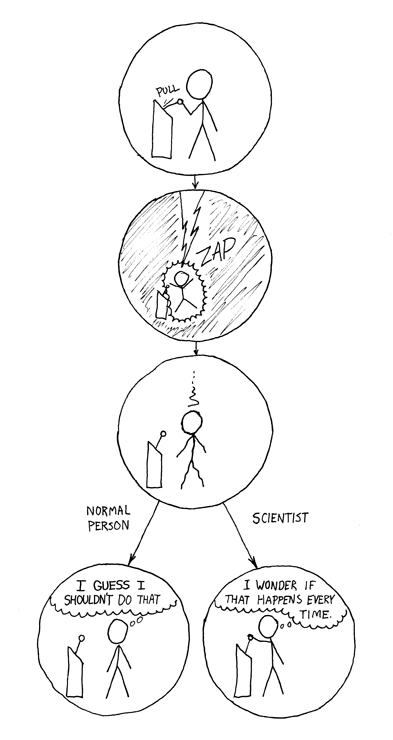Also, CONGRATS TO THE WORLD CHAMPIONS OF BASEBALL!
Thursday, October 30, 2008
Midterm on Tuesday
Also, CONGRATS TO THE WORLD CHAMPIONS OF BASEBALL!
Tuesday, October 21, 2008
Easy on the Stubborn
One of the goals of this class is to get us all to recognize what counts as good evidence and what counts as bad evidence for a claim. I think we're getting better at that. But it's not clear that we're caring about the difference once we figure it out.
We should care about good evidence. We should care about it because it's what gets us closer to the truth. When we judge an argument to be overall good, THE POWER OF LOGIC COMPELS US to believe the conclusion. If someone likes an arg, but still stubbornly disagree with its conclusion, she or he is just being irrational.
This means we should be open-minded. We should be willing to let new evidence change our current beliefs. We should be open to the possibility that we might be wrong.
Here are the first two paragraphs of a great article I just read:
The full article is available here (you have to wait for an ad to play, then click 'Enter Salon' at the top right, to see the article).Last week, I jokingly asked a health club acquaintance whether he would change his mind about his choice for president if presented with sufficient facts that contradicted his present beliefs. He responded with utter confidence. "Absolutely not," he said. "No new facts will change my mind because I know that these facts are correct."
I was floored. In his brief rebuttal, he blindly demonstrated overconfidence in his own ideas and the inability to consider how new facts might alter a presently cherished opinion. Worse, he seemed unaware of how irrational his response might appear to others. It's clear, I thought, that carefully constructed arguments and presentation of irrefutable evidence will not change this man's mind.
I think that most of the time, stubbornness is unwarranted. Psychological research has repeatedly shown that most Americans overestimate their own abilities. This is one of the biggest hurdles to proper reasoning: the natural tendency to think that we're smarter--or more powerful, or prettier, or whatever--than we really are.
This may sound insulting, but one of the goals of this class is getting us to recognize that we're not as smart as we think we are. All of us. You. Me! That one. You again. Me again!
So in the upcoming weeks, at least, I hope you'll join me in my campaign to end I'M-SPECIAL-ism.

Friday, October 17, 2008
Past Futures Are the New Past Pasts
If you're tired of that one, there's also a new problem of induction. Or, you could watch this video of Lewis Black describing his failure to reason inductively every year around Halloween:
In class, we talked about how attempts to justify induction beg the question. Here's a dinosaur comic on question-begging. (Click on the comic to enlarge it)

And here's the video for Mims's logically delicious song "This is Why I'm Hot":
Finally, here's a stick figure comic about scientists' efforts to confirm that the future will be like the past.
Friday, October 10, 2008
Innate Ideas? I've Had a Few
Here are a couple articles by Steven Pinker that offer some psychological insights on the innate ideas debate we've been discussing in class:
But hey, why read when you can watch a video? With that in mind, here's Pinker's appearance on The Colbert Report:
Pinker has a few books on this stuff, and a lot of other interesting articles, too. Not everyone agrees with Pinker, though. Here's an article about a South American tribe that might be a counterexample to the claim that there are innate aspects of language development.
(The linguist researching the tribe explains his case more here. Steven Pinker and others respond to him here.)
One more link. Here's an advanced survey article on the rationalism/empiricism debate from my favorite free online philosophy encyclopedia:
Yes, there is more than one free online philosophy encyclopedia.
Wednesday, October 8, 2008
Reading Response #2
Reading Response #2 is due at the beginning of class on Tuesday, October 14th for the Pemberton class, and Friday, October 17th for the Willingboro class. Here is the assignment:
Explain and evaluate your thoughts about God.The response isn't based on any specific reading from the textbook. Instead, it's more of a chance for you to think about your own opinion before we discuss God stuff in class over the next several weeks. You won't be graded on your opinion. You'll be graded on how well you EXPLAIN and EVALUATE your reasons for your opinion.
- First, explain what it is you believe about the existence of God. Do you believe there is a God? If so, what kind of God or Gods? Do you believe that there is no God? Do you not have a belief one way or the other?
- Next, explain why you believe whatever it is you believe about God. What reasons do you have for believing what you believe? Figure out your argument in support of your belief (even if you're belief is "I don't know," explain why you don't know!).
- Finally, evaluate your argument for what you believe. Do you think these are good reasons, or bad reasons? Why?




